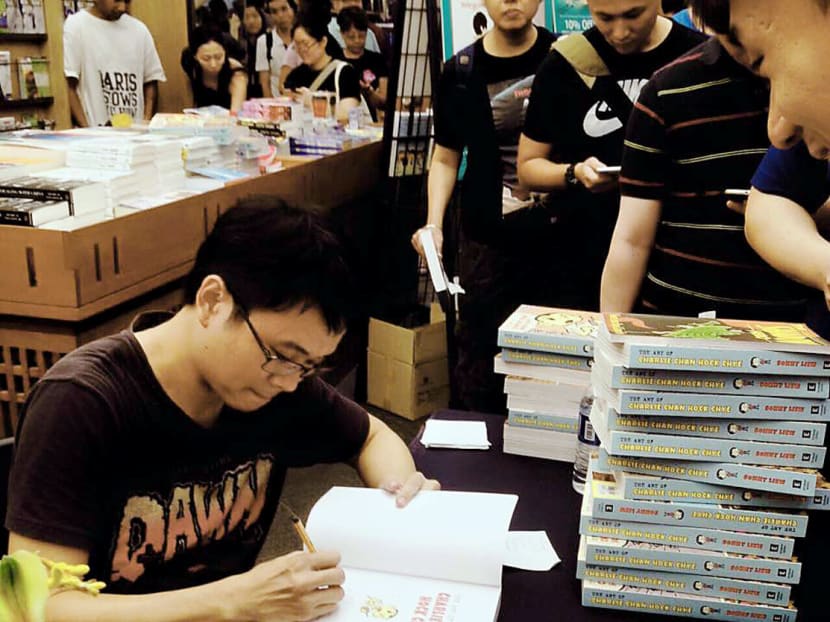Graphic novel ‘undermines govt’s authority’
SINGAPORE — The graphic novel The Art Of Charlie Chan Hock Chye — which flew off bookshelves over the weekend — potentially “undermines the authority or legitimacy” of the Government, and breached funding guidelines, the National Arts Council (NAC) explained yesterday.

Artist-illustrator Sonny Liew at the launch of The Art Of Charlie Chan Hock Chye at Books Kinokuniya in Ngee Ann City on Saturday. Photo: Epigram Books
SINGAPORE — The graphic novel The Art Of Charlie Chan Hock Chye — which flew off bookshelves over the weekend — potentially “undermines the authority or legitimacy” of the Government, and breached funding guidelines, the National Arts Council (NAC) explained yesterday.
The council was responding to queries over its decision to withdraw its publishing grant for the novel by artist-illustrator Sonny Liew, one day before its May 30 launch.
The public interest following the NAC’s move appeared to have buoyed sales of the work. Books Kinokuniya Singapore sold out its stock of 500 copies — half of the book’s entire print run of 1,000 copies — at all its branches. This included the 270 copies that were snatched up at the novel’s official launch on Saturday at the bookshop chain’s main store in Ngee Ann City.
The books have also sold out at other bookshops, according to publisher Epigram Books. “Our distributors have zero copies in the warehouse, and we have only two left in our office,” said Epigram Books’ Edmund Wee, who added that the publisher is preparing a second print run for the book, which will be out within the month.
Kinokuniya’s store and merchandising director Kenny Chan said: “This was more than three times that of a very successful book launch at our main store.”
Announcing its decision to pull back its S$8,000 grant last week, the NAC had cited “sensitive content”. Elaborating on its decision yesterday, Mr Khor Kok Wah, senior director of the NAC’s literary arts sector, said: “The retelling of Singapore’s history in the work potentially undermines the authority or legitimacy of the government and its public institutions, and thus breaches our funding guidelines. The council’s funding guidelines are published online and well known among the arts community.”
The council has spoken to the artist and the publisher on the rationale for the withdrawal, he added.
The graphic novel, about the story of comic-book artist Charlie Chan during the formative years of Singapore’s modern history, features personalities such as Singapore’s first Prime Minister Lee Kuan Yew, opposition politician Lim Chin Siong and events such as 1987’s Operation Spectrum and the Hock Lee bus riots.
Epigram Books had to return the S$6,400 that had been already disbursed as well as print stickers to cover the NAC logo in the book.
Mr Liew himself was surprised at the reception he received at the launch: “I knew the turnout would be a little bigger than the usual, given the attention we’d gotten after the news broke, but I think we were all taken aback by the level of support shown.”
With the long queue at the launch, he had to rush through the autograph-signing session because another book event had been scheduled after his.
Mr Wee reckoned that the ensuing interest was a result of different factors. “It felt like people came because they were upset over the withdrawal of the grant, but also because Sonny is a quite-well-known artist who has a following,” he said.
It has become the publisher’s fastest-selling title. “We haven’t had a book sell out in practically one week and we’ve never reprinted a book within one week,” said Mr Wee.
Other graphic novels under Epigram Books took around two years to sell out, and the average annual sales have been around 500.
Notwithstanding the successful launch, Mr Liew hopes the interest in his novel will eventually go beyond mere controversy. He said: “In the longer term, I hope the book will speak for itself, that readers will introduce it to their friends because they liked it, that its long-term success will be based on its (inherent) qualities.”








